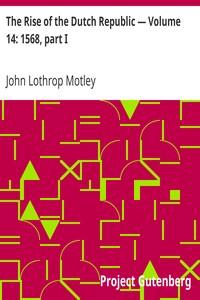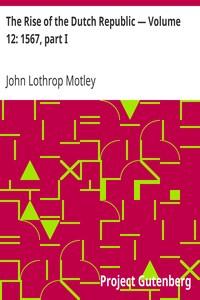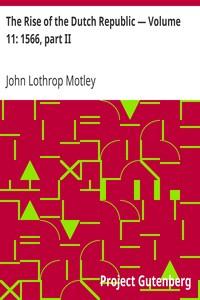|
|
Read this ebook for free! No credit card needed, absolutely nothing to pay.Words: 22259 in 4 pages
This is an ebook sharing website. You can read the uploaded ebooks for free here. No credit cards needed, nothing to pay. If you want to own a digital copy of the ebook, or want to read offline with your favorite ebook-reader, then you can choose to buy and download the ebook.

: The Rise of the Dutch Republic — Volume 14: 1568 part I by Motley John Lothrop - Netherlands History Eighty Years' War 1568-1648; Netherlands Church history@FreeBooksTue 06 Jun, 2023 Edition: 10 MOTLEY'S HISTORY OF THE NETHERLANDS, PG EDITION, VOLUME 15. THE RISE OF THE DUTCH REPUBLIC Orange, Count Louis, Hoogstraaten, and others, cited before the Blood-Council--Charges against them--Letter of Orange in reply-- Position and sentiments of the Prince--Seizure of Count de Buren-- Details of that transaction--Petitions to the Council from Louvain and other places--Sentence of death against the whole population of the Netherlands pronounced by the Spanish Inquisition and proclaimed by Philip--Cruel inventions against heretics--The Wild Beggars-- Preliminary proceedings of the Council against Egmont and Horn-- Interrogatories addressed to them in prison--Articles of accusation against them--Foreclosure of the cases--Pleas to the jurisdiction-- Efforts by the Countesses Egmont and Horn, by many Knights of the Fleece, and by the Emperor, in favor of the prisoners--Answers of Alva and of Philip--Obsequious behavior of Viglius--Difficulties arising from the Golden Fleece statutes set aside--Particulars of the charges against Count Horn and of his defence--Articles of accusation against Egmont--Sketch of his reply--Reflections upon the two trials--Attitude of Orange--His published 'Justification'--His secret combinations--His commission to Count Louis--Large sums of money subscribed by the Nassau family, by Netherland refugees, and others--Great personal sacrifices made by the Prince--Quadruple scheme for invading the Netherlands--Defeat of the patriots under Cocqueville--Defeat of Millers--Invasion of Friesland by Count Louis--Measures of Alva to oppose him--Command of the royalists entreated to Aremberg and Meghem--The Duke's plan for the campaign-- Skirmish at Dam--Detention of Meghem--Count Louis at Heiliger--Lee-- Nature of the ground--Advance of Aremberg--Disposition of the patriot forces--Impatience of the Spanish troops to engage--Battle of Heiliger-Lee--Defeat and death of Aremberg--Death of Adolphus Nassau--Effects of the battle--Anger and severe measures of Alva-- Eighteen nobles executed at Brussels--Sentence of death pronounced upon Egmont and Horn--The Bishop of Ypres sent to Egmont--Fruitless intercession by the prelate and the Countess--Egmont's last night in prison--The "grande place" at Brussels--Details concerning the execution of Egmont and Horn--Observation upon the characters of the two nobles--Destitute condition of Egmont's family. Late in October, the Duke of Alva made his triumphant entry into the new fortress. During his absence, which was to continue during the remainder of the year, he had ordered the Secretary Courteville and the Councillor del Rio to superintend the commission, which was then actually engaged in collecting materials for the prosecutions to be instituted against the Prince of Orange and the other nobles who had abandoned the country. Accordingly, soon after his return, on the 19th of January, 1568, the Prince, his brother Louis of Nassau, his brother-in-law, Count Van den Berg, the Count Hoogstraaten, the Count Culemburg, and the Baron Montigny, were summoned in the name of Alva to appear before the Blood- Council, within thrice fourteen days from the date of the proclamation, under pain of perpetual banishment with confiscation of their estates. It is needless to say that these seigniors did not obey the summons. They knew full well that their obedience would be rewarded only by death. The charges against the Prince of Orange, which were drawn up in ten articles, stated, chiefly and briefly, that he had been, and was, the head and front of the rebellion; that as soon as his Majesty had left the Netherlands, he had begun his machinations to make himself master of the country and to expel his sovereign by force, if he should attempt to return to the provinces; that he had seduced his Majesty's subjects by false pretences that the Spanish inquisition was about to be introduced; that he had been the secret encourager and director of Brederode and the confederated nobles; and that when sent to Antwerp, in the name of the Regent, to put down the rebellion, he had encouraged heresy and accorded freedom of religion to the Reformers. The articles against Hoogstraaten and the other gentlemen mere of similar tenor. It certainly was not a slender proof of the calm effrontery of the government thus to see Alva's proclamation charging it as a crime upon Orange that he had inveigled the lieges into revolt by a false assertion that the inquisition was about to be established, when letters from the Duke to Philip, and from Granvelle to Philip, dated upon nearly the same day, advised the immediate restoration of the inquisition as soon as an adequate number of executions had paved the way for the measure. It was also a sufficient indication of a reckless despotism, that while the Duchess, who had made the memorable Accord with the Religionists, received a flattering letter of thanks and a farewell pension of fourteen thousand ducats yearly, those who, by her orders, had acted upon that treaty as the basis of their negotiations, were summoned to lay down their heads upon the block. The Prince replied to this summons by a brief and somewhat contemptuous plea to the jurisdiction. As a Knight of the Fleece, as a member of the Germanic Empire, as a sovereign prince in France, as a citizen of the Netherlands, he rejected the authority of Alva and of his self- constituted tribunal. His innocence he was willing to establish before competent courts and righteous judges. As a Knight of the Fleece, he said he could be tried only by his peers, the brethren of the Order, and, for that purpose, he could be summoned only by the King as Head of the Chapter, with the sanction of at least six of his fellow-knights. In conclusion, he offered to appear before his Imperial Majesty, the Electors, and other members of the Empire, or before the Knights of the Golden Fleece. In the latter case, he claimed the right, under the statutes of that order, to be placed while the trial was pending, not in a solitary prison, as had been the fate of Egmont and of Horn, but under the friendly charge and protection of the brethren themselves. The letter was addressed to the procurator-general, and a duplicate was forwarded to the Duke. From the general tenor of the document, it is obvious both that the Prince was not yet ready to throw down the gauntlet to his sovereign, nor to proclaim his adhesion to the new religion: Of departing from the Netherlands in the spring, he had said openly that he was still in possession of sixty thousand florins yearly, and that he should commence no hostilities against Philip, so long as he did not disturb him in his honor or his estates. Far-seeing politician, if man ever were, he knew the course whither matters were inevitably tending, but he knew how much strength was derived from putting an adversary irretrievably in the wrong. He still maintained an attitude of dignified respect towards the monarch, while he hurled back with defiance the insolent summons of the viceroy. Moreover, the period had not yet arrived for him to break publicly with the ancient faith. Statesman, rather than religionist, at this epoch, he was not disposed to affect a more complete conversion than the one which he had experienced. He was, in truth, not for a new doctrine, but for liberty of conscience. His mind was already expanding beyond any dogmas of the age. The man whom his enemies stigmatized as atheist and renegade, was really in favor of toleration, and therefore, the more deeply criminal in the eyes of all religious parties. Events, personal to himself, were rapidly to place him in a position from which he might enter the combat with honor. His character had already been attacked, his property threatened with confiscation. His closest ties of family were now to be severed by the hand of the tyrant. His eldest child, the Count de Buren, torn from his protection, was to be carried into indefinite captivity in a foreign land. It was a remarkable oversight, for a person of his sagacity, that, upon his own departure from the provinces, he should leave his son, then a boy of thirteen years, to pursue his studies at the college of Louvain. Thus exposed to the power of the government, he was soon seized as a hostage for the good behavior of the father. Granvelle appears to have been the first to recommend the step in a secret letter to Philip, but Alva scarcely needed prompting. Accordingly, upon the 13th of February, 1568, the Duke sent the Seignior de Chassy to Louvain, attended by four officers and by twelve archers. He was furnished with a letter to the Count de Buren, in which that young nobleman was requested to place implicit confidence in the bearer of the despatch, and was informed that the desire which his Majesty had to see him educated for his service, was the cause of the communication which the Seignior de Chassy was about to make. That gentleman was, moreover, minutely instructed as to his method of proceeding in this memorable case of kidnapping. He was to present the letter to the young Count in presence of his tutor. He was to invite him to Spain in the name of his Majesty. He was to assure him that his Majesty's commands were solely with a view, to his own good, and that he was not commissioned to arrest, but only to escort him. He was to allow the Count to be accompanied only by two valets, two pages, a cook, and a keeper of accounts. He was, however, to induce his tutor to accompany him, at least to the Spanish frontier. He was to arrange that the second day after his arrival at Louvain, the Count should set out for Antwerp, where he was to lodge with Count Lodron, after which they were to proceed to Flushing, whence they were to embark for Spain. At that city he was to deliver the young Prince to the person whom he would find there, commissioned for that purpose by the Duke. As soon as he had made the first proposition at Louvain to the Count, he was, with the assistance of his retinue, to keep the most strict watch over him day and night, but without allowing the supervision to be perceived. Free books android app tbrJar TBR JAR Read Free books online gutenberg More posts by @FreeBooks
: The Rise of the Dutch Republic — Volume 12: 1567 part I by Motley John Lothrop - Netherlands History Eighty Years' War 1568-1648; Netherlands Church history@FreeBooksTue 06 Jun, 2023

: The Rise of the Dutch Republic — Volume 11: 1566 part II by Motley John Lothrop - Netherlands History Eighty Years' War 1568-1648; Netherlands Church history@FreeBooksTue 06 Jun, 2023
|
Terms of Use Stock Market News! © gutenberg.org.in2025 All Rights reserved.






